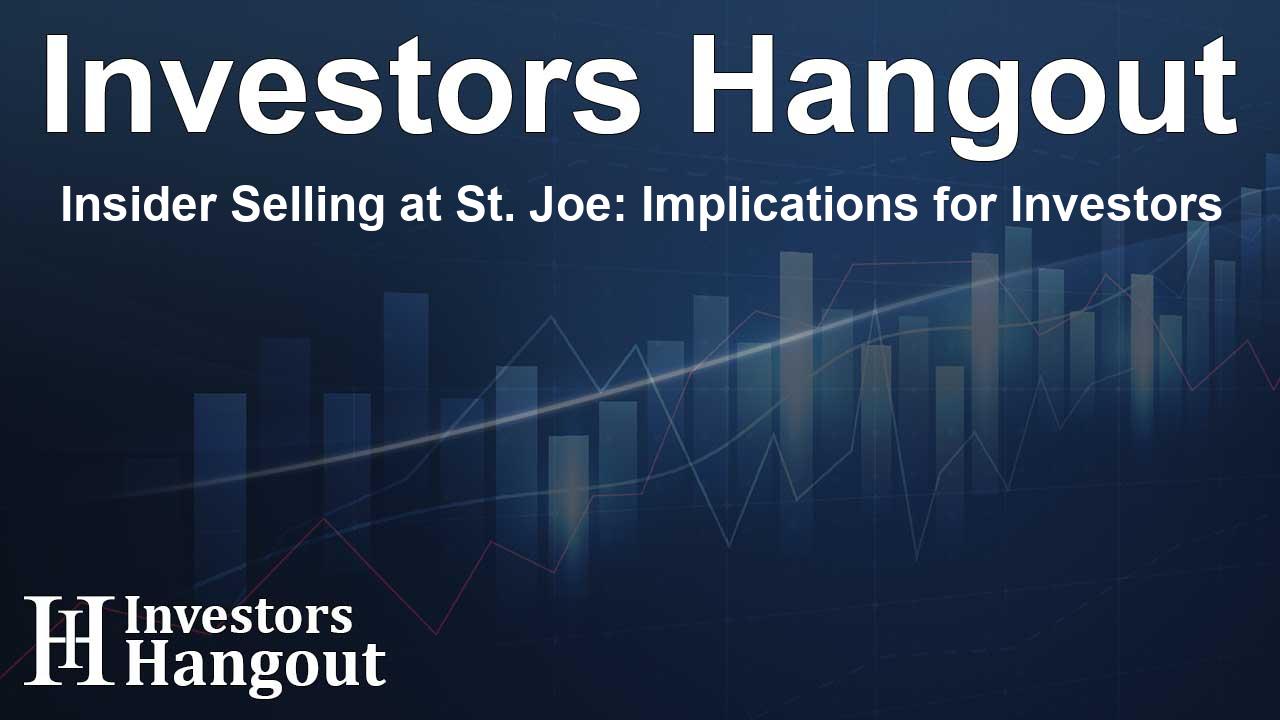Insider Selling at St. Joe: Implications for Investors

Insider Trading Activity at St. Joe
BRUCE BERKOWITZ, a significant stakeholder in St. Joe (JOE), recently reported a notable insider sale. This occurred recently and was filed with the SEC. According to the submitted documentation, Berkowitz sold 55,000 shares for a transaction value of approximately $2.76 million.
Current Stock Performance
The trading of St. Joe shares is currently active, with the stock priced around $50.00, showing a slight increase of 0.12%. This steady activity suggests confidence among investors regarding the company’s prospects.
Understanding St. Joe's Business Operations
The St. Joe Co operates primarily in real estate development and management. The firm has diversified its operations into three segments: Residential, Hospitality, and Commercial. Their Residential segment is heavily involved in developing communities and selling homesites. The Hospitality segment generates considerable revenue through various leisure and retail operations, including hotels, restaurants, golf courses, and vacation rentals. Lastly, the Commercial segment manages leasing and development of commercial properties as well as multi-family and senior living spaces.
Financial Highlights and Competitive Standing
Assessing Revenue Growth
Recently, St. Joe demonstrated a remarkable performance with a revenue growth of 15.66%, emphasizing their capability to exceed industry expectations. This growth trajectory positions the company favorably within the competitive landscape of the real estate market.
Profitability Insights
- Gross Margin Analysis: St. Joe maintained a robust gross margin of 42.91%, indicating effective cost management strategies which exceed those of many peers.
- Earnings Per Share (EPS): The current EPS stands at 0.51, which is significantly above industry norms, suggesting solid profitability.
Debt Profile Evaluation
However, St. Joe's debt-to-equity ratio registers at 0.83, a metric higher than the industry average, indicating an increased reliance on borrowed funds, thus raising potential concerns regarding financial leverage.
Valuation Metrics In-Depth
- Price to Earnings (P/E) Ratio: St. Joe exhibits a P/E ratio of 35.17, hinting at possible overvaluation from an investor perspective.
- Price to Sales (P/S) Ratio: The firm’s P/S ratio is 6.82, indicating the stock might be perceived as expensive relative to sales.
- EV/EBITDA Ratio: With an EV/EBITDA ratio of 17.96, St. Joe’s valuation is significantly above industry averages, underscoring the premium market perception.
Company Size and Market Capitalization
St. Joe enjoys a substantial market capitalization, a testament to its size and industry recognition, positioning it as a key player in real estate development.
The Role of Insider Transactions
Understanding insider transactions can provide critical insights into a company's outlook. While insider sales might typically raise red flags, they can also arise for various non-pessimistic reasons. Monitoring these transactions can be imperative for investors seeking a better understanding of market sentiment.
Final Thoughts
Investing in any stock, including St. Joe, should involve thorough analysis. Insiders like Bruce Berkowitz play a pivotal role in shaping perceptions, and their transactions warrant attention. Keeping abreast of such developments can help investors make informed decisions.
Frequently Asked Questions
What does Bruce Berkowitz's insider sale indicate?
Insider sales can signal varying perspectives about the company's future. Berkowitz's transaction alone doesn't necessarily indicate negative sentiment toward St. Joe.
How has St. Joe's revenue grown?
St. Joe has reported a growth of 15.66% in revenue, showcasing its strong performance relative to competitors.
What is St. Joe's current market position?
St. Joe remains a significant contender in the real estate market, with a strong operational structure and market capitalization.
What is the importance of the P/E ratio?
The P/E ratio helps investors gauge if a stock is overvalued or undervalued compared to earnings.
What impact does insider trading have on stock prices?
Insider trading can influence perceptions of a company's stability, potentially impacting stock prices, especially when analyzed in context.
About The Author
Contact Evelyn Baker privately here. Or send an email with ATTN: Evelyn Baker as the subject to contact@investorshangout.com.
About Investors Hangout
Investors Hangout is a leading online stock forum for financial discussion and learning, offering a wide range of free tools and resources. It draws in traders of all levels, who exchange market knowledge, investigate trading tactics, and keep an eye on industry developments in real time. Featuring financial articles, stock message boards, quotes, charts, company profiles, and live news updates. Through cooperative learning and a wealth of informational resources, it helps users from novices creating their first portfolios to experts honing their techniques. Join Investors Hangout today: https://investorshangout.com/
The content of this article is based on factual, publicly available information and does not represent legal, financial, or investment advice. Investors Hangout does not offer financial advice, and the author is not a licensed financial advisor. Consult a qualified advisor before making any financial or investment decisions based on this article. This article should not be considered advice to purchase, sell, or hold any securities or other investments. If any of the material provided here is inaccurate, please contact us for corrections.
